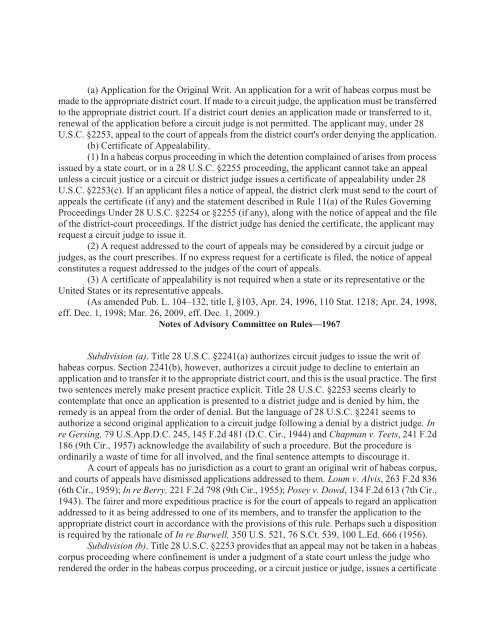Federal Rules of Appellate Procedure 2014-2015, 2014a
Federal Rules of Appellate Procedure 2014-2015, 2014a
Federal Rules of Appellate Procedure 2014-2015, 2014a
You also want an ePaper? Increase the reach of your titles
YUMPU automatically turns print PDFs into web optimized ePapers that Google loves.
(a) Application for the Original Writ. An application for a writ <strong>of</strong> habeas corpus must be<br />
made to the appropriate district court. If made to a circuit judge, the application must be transferred<br />
to the appropriate district court. If a district court denies an application made or transferred to it,<br />
renewal <strong>of</strong> the application before a circuit judge is not permitted. The applicant may, under 28<br />
U.S.C. §2253, appeal to the court <strong>of</strong> appeals from the district court's order denying the application.<br />
(b) Certificate <strong>of</strong> Appealability.<br />
(1) In a habeas corpus proceeding in which the detention complained <strong>of</strong> arises from process<br />
issued by a state court, or in a 28 U.S.C. §2255 proceeding, the applicant cannot take an appeal<br />
unless a circuit justice or a circuit or district judge issues a certificate <strong>of</strong> appealability under 28<br />
U.S.C. §2253(c). If an applicant files a notice <strong>of</strong> appeal, the district clerk must send to the court <strong>of</strong><br />
appeals the certificate (if any) and the statement described in Rule 11(a) <strong>of</strong> the <strong>Rules</strong> Governing<br />
Proceedings Under 28 U.S.C. §2254 or §2255 (if any), along with the notice <strong>of</strong> appeal and the file<br />
<strong>of</strong> the district-court proceedings. If the district judge has denied the certificate, the applicant may<br />
request a circuit judge to issue it.<br />
(2) A request addressed to the court <strong>of</strong> appeals may be considered by a circuit judge or<br />
judges, as the court prescribes. If no express request for a certificate is filed, the notice <strong>of</strong> appeal<br />
constitutes a request addressed to the judges <strong>of</strong> the court <strong>of</strong> appeals.<br />
(3) A certificate <strong>of</strong> appealability is not required when a state or its representative or the<br />
United States or its representative appeals.<br />
(As amended Pub. L. 104–132, title I, §103, Apr. 24, 1996, 110 Stat. 1218; Apr. 24, 1998,<br />
eff. Dec. 1, 1998; Mar. 26, 2009, eff. Dec. 1, 2009.)<br />
Notes <strong>of</strong> Advisory Committee on <strong>Rules</strong>—1967<br />
Subdivision (a). Title 28 U.S.C. §2241(a) authorizes circuit judges to issue the writ <strong>of</strong><br />
habeas corpus. Section 2241(b), however, authorizes a circuit judge to decline to entertain an<br />
application and to transfer it to the appropriate district court, and this is the usual practice. The first<br />
two sentences merely make present practice explicit. Title 28 U.S.C. §2253 seems clearly to<br />
contemplate that once an application is presented to a district judge and is denied by him, the<br />
remedy is an appeal from the order <strong>of</strong> denial. But the language <strong>of</strong> 28 U.S.C. §2241 seems to<br />
authorize a second original application to a circuit judge following a denial by a district judge. In<br />
re Gersing, 79 U.S.App.D.C. 245, 145 F.2d 481 (D.C. Cir., 1944) and Chapman v. Teets, 241 F.2d<br />
186 (9th Cir., 1957) acknowledge the availability <strong>of</strong> such a procedure. But the procedure is<br />
ordinarily a waste <strong>of</strong> time for all involved, and the final sentence attempts to discourage it.<br />
A court <strong>of</strong> appeals has no jurisdiction as a court to grant an original writ <strong>of</strong> habeas corpus,<br />
and courts <strong>of</strong> appeals have dismissed applications addressed to them. Loum v. Alvis, 263 F.2d 836<br />
(6th Cir., 1959); In re Berry, 221 F.2d 798 (9th Cir., 1955); Posey v. Dowd, 134 F.2d 613 (7th Cir.,<br />
1943). The fairer and more expeditious practice is for the court <strong>of</strong> appeals to regard an application<br />
addressed to it as being addressed to one <strong>of</strong> its members, and to transfer the application to the<br />
appropriate district court in accordance with the provisions <strong>of</strong> this rule. Perhaps such a disposition<br />
is required by the rationale <strong>of</strong> In re Burwell, 350 U.S. 521, 76 S.Ct. 539, 100 L.Ed. 666 (1956).<br />
Subdivision (b). Title 28 U.S.C. §2253 provides that an appeal may not be taken in a habeas<br />
corpus proceeding where confinement is under a judgment <strong>of</strong> a state court unless the judge who<br />
rendered the order in the habeas corpus proceeding, or a circuit justice or judge, issues a certificate


















